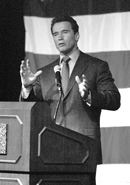March 11 would have been gay marriage kick-off but for Bloomberg appeal
This Friday, March 11 could have been the wedding day for Eleanor Cooper and Joy Kallio, two mothers of the lesbian movement in New York.
It was the date on which New York State Supreme Court Justice Doris Ling-Cohan’s 30-day stay of her own ruling that same-sex couples must be able to marry in New York City would have expired had not Mayor Michael Bloomberg appealed that decision.
Gay marriage activists will mark March 11 with a demonstration against Bloomberg’s challenge at 10 a.m. at City Hall and Kallio, 49, will be there, as she has been for countless actions since the early 1970s. Her partner, Eleanor Cooper, 64, one of the principal leaders of the movement that passed the city law that banned discrimination on the basis of sexual orientation in 1986, will pass the day as she has virtually all of the last seven—in the Jewish Home and Hospital on the upper west side where she resides due to a stroke that left her paralyzed on her left side.
Cooper, given her physical limitations, does not have the option of traveling to Canada to marry Kallio.
“We were all excited about having gay marriage come to New York,” Kallio said, “and Bloomberg quashed it. I was ready to dash up here to the home and get Eleanor before anything went wrong with the decision.”
Had Bloomberg not appealed the decision, same-sex couples from all over the world could have legally married in New York City until a higher court or the legislature stopped them. Unlike in San Francisco where Mayor Gavin Newsom last February opened marriage up gay couples unilaterally, Bloomberg would have been acting under a legal order of the court.
Cooper, laboring under her stroke, doesn’t say much these days. But when she does pipe up, it is usually to say something incisive. “He screwed us thoroughly,” she said of Bloomberg. “Nasty man.”
The mayor contended that failing to appeal the order would lead to “chaos” as in San Francisco where a higher court undid the 4,000 same-sex marriages performed there. Jonathan Capehart, a gay public relations executive who informally advised Bloomberg on this decision, told The New York Times, “”No one has written the story about how devastated people were when the California court came back and said those marriage licenses didn’t mean anything.”
Beyond the fact that most of the San Francisco couples knew they were engaging in civil disobedience and donated the fees for their marriage licenses to a defense fund for the city, Kallio said, “Not only would I not have been disappointed if our marriage were declared illegal later, even being married for a week…”
“….would have been good,” said Cooper, completing Kallio’s sentence.
Cooper and Kallio met at the legendary Firehouse, the gay and lesbian community center on Wooster Street that housed the Gay Activists Alliance and its spinoff, Lesbian Feminist Liberation (LFL) in the early 1970s, before burning down in 1974.
Cooper was the internal coordinator of LFL and got Kallio, then 19, to “accidentally volunteer” to be the program coordinator at her first meeting. “I thought it meant getting the coffee,” Kallio said. Instead it meant planning all the group’s Sunday programs and demonstrations.

Kallio had come to New York after being fired from an Outward Bound job upstate. While on a field trip, her male boss peeped into the room that she shared with her woman partner, also an employee, and fired them both on the spot and throwing them out into a thunderstorm.
“They never paid us, either,” Kallio recalled, “and the ACLU told me I didn’t have a leg to stand on if I wanted to fight it. I made a decision that I had to fight for my gay rights before anything.”
Cooper was already active in the New York lesbian movement when Kallio arrived and would later become a founder and spokesperson for the citywide Coalition for Lesbian and Gay Rights in 1977, serving into the ‘90s.
“We were a couple for two or three years,” said Kallio, “then had other people in our lives. But Eleanor remained family for me.”
“Thirty years of love and devotion,” Cooper said, of their eventual reconnection as partners. “It has been so long that we have not been able to get married.”
Kallio has battled severe endometriosis and has had periods of disability, but is employed now and lives on her own in Chelsea. Now she is able to volunteer as an auxiliary police officer, assisting with emergency medical services, and to serve on the board of Stonewall Democrats.
Cooper worked as an exterminator with “Lady Killers” to pay her bills while she devoted most of her time to the Women’s Center, in Chelsea, where LFL was headquarter—including stoking its coal furnace—and the lesbian and gay movement. Seven years ago, a disabling stroke landed Cooper in the Jewish Home.
“I don’t like being stuck in a nursing home while Joy is out there,” Cooper said.
Kallio explained, “If we were married, we’d have more rights,” including being able to apply for assisted housing together.
“This deprivation of our civil rights is incredibly painful and unfair,” Cooper said.
gaycitynews.com




































